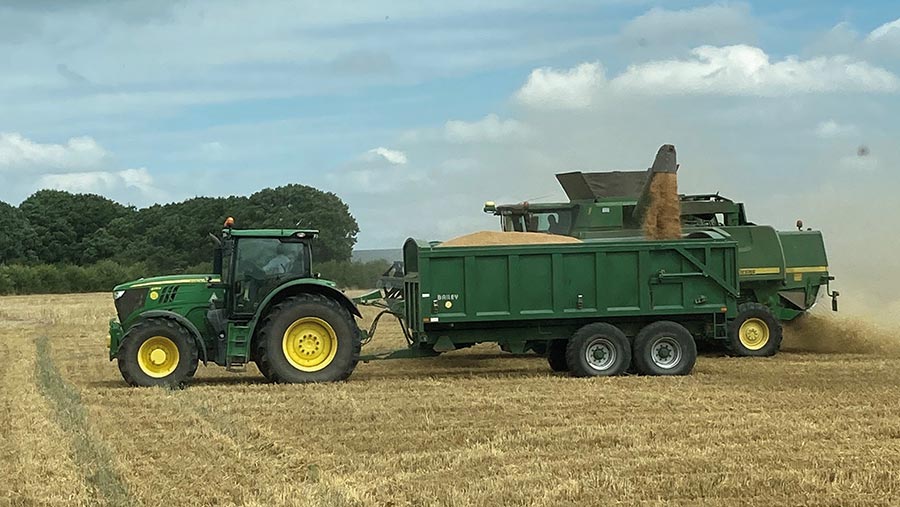Agronomists play down ‘sporadic’ Extase grain fill issues
 © Joe Fisher
© Joe Fisher Consultants and cereals experts have backed the wheat variety Extase after growers across England reported sporadic cases of under-developed ears and shrivelled grain.
The variety is hugely popular and accounts for about 10% of the UK wheat crop, according to Niab’s cereal varieties expert Clare Leaman, who said the vast majority of the crop had performed strongly in an extremely challenging year.
See also: Graham and Extase tipped as wheats for the South West
However, Mrs Leaman confirmed that Niab had been dealing with enquiries about Extase and, to a lesser extent, some other varieties.
Growers reported that crops had often looked promising in the field, with predicted yields above 12t/ha, but at harvest yields were lower.
Any difficulties had been “sporadic”, she added, suggesting the cause may be a combination of the variety’s trait for early development, poor growing conditions and chemical interactions.
John Miles, seed technical manager for consultancy Agrii, said agronomists had been discussing reports of problems, but he also emphasised the extreme growing conditions during 2020-21.
February and March were dry, April recorded heavy frosts across numerous dates, May rainfall was high, June was dull and July saw temperatures above 30C, he said – a punishing year for plants.
With Extase’s early development, it may have suffered frosts and rain at a more vulnerable point while others were further back, Mr Miles added.
Under conditions like that, the plant will drop tillers and may then prioritise grain in the main ear and drop the tillers, possibly resulting in the unfilled ears.
‘Perspective’
Crop consultant Steve Harrison, who covers parts of the West Country and south Wales, confirmed that growers in his area had reported issues.
But he urged growers to appreciate that the difficulty was on a relatively small scale, with online discussion groups fuelling speculation.
“We must avoid damning things by anecdote and instead look for facts and keep a clear perspective,” Mr Harrison said.
He pointed out that Extase had produced some of the best yields on his patch despite the harsh conditions, which included high septoria levels.
Patrick Stephenson in the Yorkshire Wolds also said growers in his region had recorded problems with aborted grains at the top of the ears, as did East Anglian agronomist Ryan Hudson.
‘Breakthrough variety’
But variety breeder KWS played down the reports, describing Extase as a “breakthrough variety bringing unique benefits to UK growers”.
UK country manager Will Compson said: “These include exceptional untreated yield, excellent septoria control, early maturity, good straw and fantastic grain quality with potential for milling, feed and UKP markets.”
He said the company had received less than 10 reports of fields with issues of poorly filled grain sites from the 200,000ha of Extase grown in 2021. Other varieties had also suffered.
“In AHDB and distributor trials across the country, KWS Extase has performed exceptionally well in 2021, with an average yield at 104% of controls (10.46t/ha) compared to its five-year mean of 100.5% of controls (10.81 t/ha).”
Mr Compson agreed that 2020-21 had been an unusual growing season, placing a number of different stresses on crops.
“In the small number cases of poor grain fill reported to us, it is believed spray applications in April coincided with late frosts and this created overwhelming stress in some plants,” he said. “Late herbicide applications, in particular, seem to have been a significant causal factor.”

